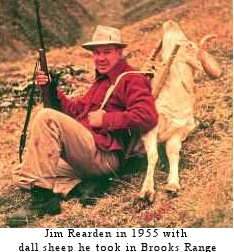|
 (Note: Jim Rearden submitted the following written comments for a January 19, 2011 public hearing on the proposed Chuitna River coal mine.)
(Note: Jim Rearden submitted the following written comments for a January 19, 2011 public hearing on the proposed Chuitna River coal mine.)
Mr. Chairman:
Why would the Alaska Department of Natural Resources even consider
a mining proposal that would completely destroy eleven miles of one of
Alaska's beautiful, pristine rivers? That they are even considering it is an
insult to every Alaskan, and to the land itself. In my sixty-one years involved
with Alaska's renewable resources, the only other comparable seriously
proposed rape of the land I can remember was when Governor Gruening
wanted to dam the Yukon River. The dam was to be called the Gruening
dam.
What a beautiful land! is the most heard comment of visitors to our
state. One wonders what visitors would say of a ditch that has replaced a
lovely natural stream.
Alaska's salmon management is the envy of fishery management
agencies around the world. From territorial days to the present we Alaskans
have been protective of our salmon streams. The well-being and future of
our salmon depends on the health of these rivers. We have prohibited dams
that could keep salmon from spawning grounds. To protect spawning
grounds and prevent silting, one cannot legally drive a tractor across a
salmon stream. The federal government almost destroyed Alaska's salmon
runs. State management brought them back. Are we now going to reverse
half a century of careful scientific management?
When statehood arrived Alaska's salmon managers (I was one of
these) had mostly pristine rivers to work with. To my knowledge no agency
or private company has ever destroyed a beautiful salmon river, claiming it
will remediate, or replace it, in its former shape.
How many thousands of years have the five species of Pacific salmon
evolved in river 2003? (That is what the miners call it; we call it Middle
Creek) Every atom in their bodies has in one way or another been modified
over the centuries by the water in the river, by contact with the other river
inhabitants, timing of the annual freeze up, temperature variances, and
other environmental factors. That must include aquatic and shoreline plants,
birds, mammals, and insects, all important in the life cycle of salmon. To
consider destroying the present runs of salmon and replacing them with
comparable stocks would be impossible.
Only God would be capable of reproducing a viable 11 miles of salmon
stream and all its fixings, and it might even take Him some time.
It is impossible to set a dollar value on the salmon from any stream for
the simple reason we don't know how long we will be here. Salmon is an
eternally renewable resource. What would be the dollar value of salmon from
river 2003 over the next 10,000 years? Compare that with 25 years of
income from coal shipped to China, most of which would go to Outside
investors, if the dreams of those proposing this coal mining monstrosity
come true.
There are many food starved nations in our world today. What will the
world look like in 10,000 years? One wonders what choice Alaska would
make 10,000 years from now. Would it be salmon or coal? I'm betting on
salmon. The proposed Chuitna coal mine should not be allowed.
Back to Chuitna main page
|
.jpg)

.jpg)
.jpg)
.jpg)
.jpg)
.jpg)
.jpg)
.jpg)

 (Note: Jim Rearden submitted the following written comments for a January 19, 2011 public hearing on the proposed Chuitna River coal mine.)
(Note: Jim Rearden submitted the following written comments for a January 19, 2011 public hearing on the proposed Chuitna River coal mine.)